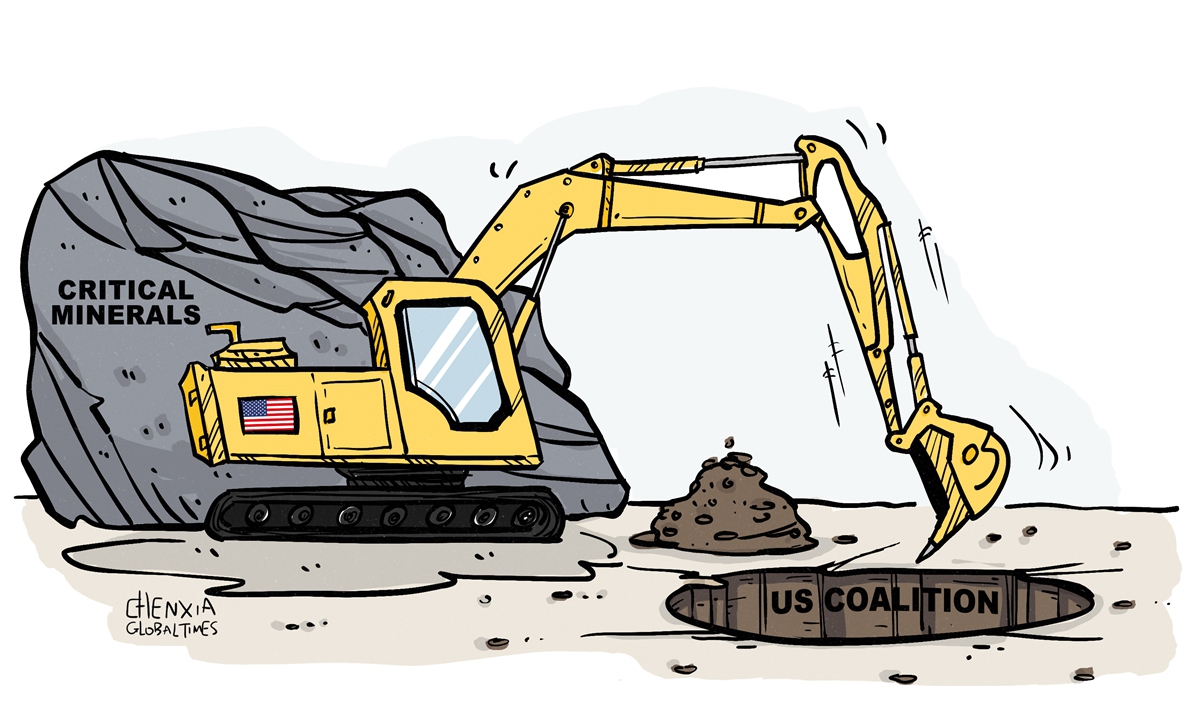
Illustration: Chen Xia/Global Times
As critical mineral resources appear to have become a new "battlefield" in the eyes of Western powers, Western media outlets have been playing up both the risks of the so-called dependence on China and China's obtaining valuable global mineral resources. If anything, it mostly indicates a disturbing development that the evil grip of US containment to China's development has spilled over into key minerals.
One of the clearest signs is that Western media coverage about the race for critical mineral materials has become more frequent than ever before. A report from CNBC said on Tuesday that Canada is positioning itself as a solution for the many European governments that are looking to rely less on China for critical raw materials.
In a Monday article entitled "China set to tighten grip over global cobalt supply as price hits 32-month low," the Financial Times said that over the next two years, China's share of cobalt production is expected to reach half of global output.
Yet, this kind of hype over the so-called China control over global critical minerals is completely groundless and ill-intentioned. With the development of strategic emerging industries, global demand for key mineral resources will continue to increase. As a manufacturing power, China's demand for some key minerals will also be on the rise, so won't it be an objective need for China's industrial development to increase exploitation and extraction of those minerals?
Indeed, anyone who has the basic knowledge about the global supply chain for key minerals would know that no country is rich enough in key minerals to control the global market. Take the most commonly used minerals as an example. In terms of minerals refining, China's share is 35 percent for nickel, 65 percent for cobalt, and 58 percent for lithium, but in terms of mineral resources distribution, lithium resources are mainly distributed in Australia, Chile and China; cobalt resources are mainly distributed in Congo, Australia and Russia; nickel resources are mainly distributed in Indonesia, Philippines and Russia, according to media reports.
The West labeling China's normal commercial operations in the key mineral supply chains as seeking control over critical resources actually reflects their malicious attempt to curb China's development from the beginning of the industrial chain. This is to say, the Western hype about China dependence or control is not just aimed at finding alternatives, but also at joining forces to hinder China's pursuit of cooperation and development in the global mineral resources.
Apparently, Western countries, led by the US, are increasingly inclined to copy their "decoupling" strategy in the high-tech sector to the key minerals field, which could be another major step aimed at containing China. But the move full of Cold War mentality risks further disrupting normal trade and the security of global new-energy industrial and supply chains, which may even backfire on some Western countries' current industrial development.
After Canada had asked three Chinese companies to sell their stakes in Toronto-listed lithium explorers following a national security review in November 2022, the decision drew criticism from the mining industry and the Toronto Stock Exchange said the intervention risked harming the free flow of capital on which mining companies rely to explore and develop resources, according to the Financial Times.
Moreover, there are more and more signs that diversifying their supply chains in key minerals is nothing but Western excuse for engaging in hegemonic groups hoarding mineral resources. Last year, the US launched the Minerals Security Partnership with other key minerals-rich countries, which is referred by senior metals columnist Andy Home as a "metallic NATO."
Fundamentally speaking, the alliance is nothing but another US-led industrial chain alliance that seeks to exclude China, with the ultimate goal of slowing China's development, containing its high-tech progress, and suppressing its manufacturing.
Then, what should China do in response to the new attack by the West? At any time, cooperation is always the best way to resist containment. Therefore, China needs to accelerate cooperation with countries along the Belt and Road Initiative route and other developing countries in terms of mineral resources. Meanwhile, it needs to constantly improve its own mineral resources development by upgrading relevant technologies. Also, it is important for China to actively improve its position in the global pricing system.




